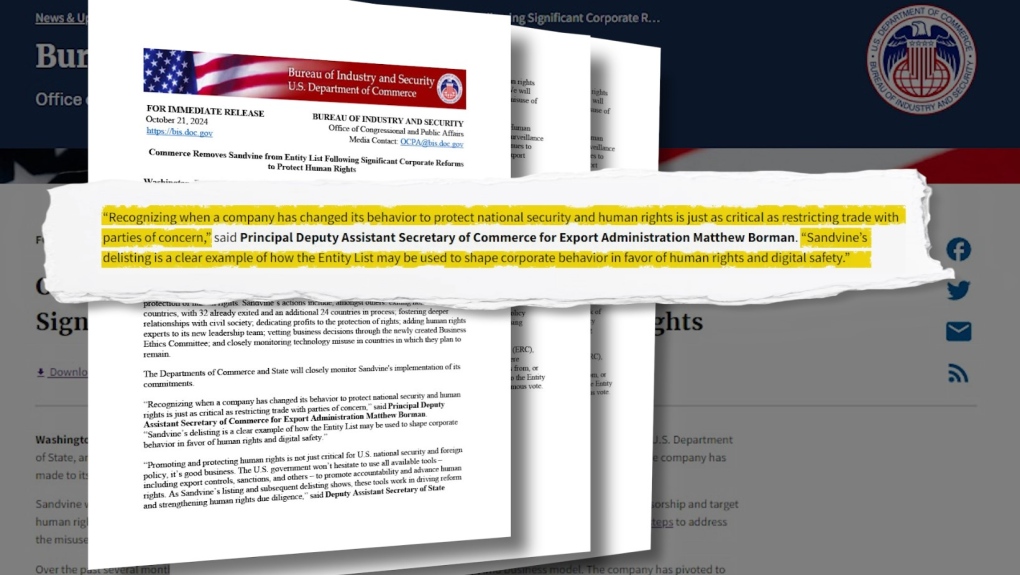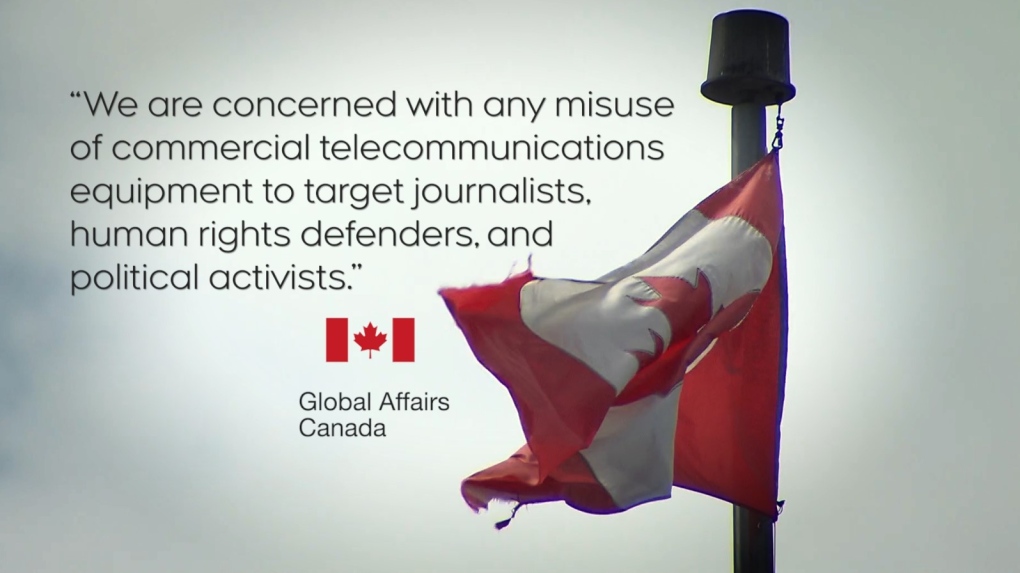Removed from U.S. blacklist: Waterloo, Ont. tech company promises major changes, watchdogs remain hesitant
Things could be looking up for Waterloo, Ont.-based company and former tech darling Sandvine, after being removed from the U.S. Department of Commerce Entity List earlier this week.
It was placed on the trade restriction list in February, and prevented from doing business south of the border, after supposedly supplying the Egyptian government with its deep packet inspection technology, which was used to target human rights activists and dissidents.
 Sandvine was removed from the U.S. Department of Commerce Entity List
Sandvine was removed from the U.S. Department of Commerce Entity List
“I think it had a real dramatic impact on their shareholders and the company profile. They had to lay off a lot of people. The entire ownership group was dismissed and replaced with a new one,” said Ron Deibert, director at The Citizen Lab, an internet watchdog group that flagged the misuse of Sandvine’s tech.
The company announced several other transformative changes in September, in an attempt to repair its image. They claim they consulted a number of groups about reforming their approach to this tech space.
“Considering that The Citizen Lab was the organization that published the first reports about abuse of Sandvine’s products and actually was threatened with litigation at one point by Sandvine’s former executives, it would seems to make sense that they would reach out to us, but they did not,” said Deibert.
It seemed the promises were enough for the U.S. Department of Commerce though due to the decision to remove Sandvine from the Entity List.
“Recognizing when a company has changed its behavior to protect national security and human rights is just as critical as restricting trade with parties of concern,” a statement reads in part from Matthew Borman, principal deputy assistant secretary of commerce for export administration. “Sandvine’s delisting is a clear example of how the Entity List may be used to shape corporate behavior in favor of human rights and digital safety.”
Sandvine says it has already removed its technology from dozens of countries where the democratic process is in question, and has identified end-of-service dates for Egypt.
But The Citizen Lab wonders whether their practices have truly changed.
“I can see there are Sandvine installations operating in a number of very problematic countries and probably will be for a while,” said Deibert.
The Citizen Lab and other internet watchdogs say they’ve also made repeated calls for the Canadian federal government to be more proactive when it comes to setting rules around the export of this type of technology.
“This was really a bit of a national embarrassment. I would be a bit ashamed if I worked in the Department of Foreign Affairs,” said Deibert.
 Part of a statement from Global Affairs Canada to CTV News Kitchener
Part of a statement from Global Affairs Canada to CTV News Kitchener
In a statement to CTV News, Global Affairs Canada maintains it is committed to the protection of human rights online and offline.
“We are concerned with any misuse of commercial telecommunications equipment to target journalists, human rights defenders, and political activists,” a statement reads in part from spokesperson Jean-Pierre J. Godbout.
When it comes to Sandvine, CTV News Kitchener has reached out to the company every time we have done a story surrounding this controversy.
Sandvine has never responded.
CTVNews.ca Top Stories

Canadian among three climbers missing on New Zealand's highest peak
A Canadian is among three climbers missing after they'd planned to climb New Zealand's highest peak.
Toronto library apologizes after staff at east-end branch refuse to help lost girl
The Toronto Public Library is apologizing after staff at a branch in the city’s east end refused to provide a lost child with access to a telephone.
2 Ontario men charged after police seize US$40M in suspected cocaine from tractor-trailer in Illinois
Two Ontario men are facing charges after police in the U.S. say they seized 540 kilograms of cocaine from a tractor-trailer along Interstate 80 in Illinois.
Quebec prisons on lockdown after correctional officer severely beaten
Quebec prisons were in lockdown on Tuesday after a correction officer at the Sorel-Tracy detention centre was attacked this week.
After meeting with Trump, Trudeau to brief opposition leaders
Prime Minister Justin Trudeau will meet with all opposition leaders today before question period to brief them about his meeting with U.S. president-elect Donald Trump.
This salad brand is being recalled again. Here's why
A Taylor Farms salad kit is being recalled over concerns of a salmonella contamination, according to the Canadian Food Inspection Agency.
Young Manitoba woman dies after medical emergency during dental appointment
The Manitoba Dental Association (MDA) said it is investigating a critical incident where a young woman from the Morden-Winkler area died following a dental appointment.
Here's where Canadian experts stand on fluoridating drinking water
For decades, water fluoridation has played a key role in improving the oral health of North Americans, experts say, but the practice is coming under scrutiny in some communities as opponents gain new prominence in the U.S., pointing to research that cautions about the risks of exposure to the mineral in high doses.
Residents of Alta. town vote in favour of bylaw banning rainbow flags, crosswalks
Residents of a northern Alberta town have voted in favour of a bylaw banning Pride flags and rainbow crosswalks from municipal property.

































